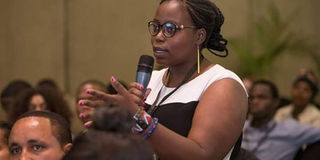BOLD WOMAN: Malkia's Jedidah Lemaron

Jedidah Lemaron. PHOTO | COURTESY
What you need to know:
- Seeing so many of my classmates drop out of school because of Female Genital Mutilation (FGM), early marriage and menstruation affected me.
- I was among 60 young Kenyan leaders chosen to go for training in the US and even got funding for my menstrual hygiene program in Kajiado.
- There is a lot of stigma associated with teenage motherhood and we are trying to change that.
Jedidah Lemaron is a Mandela Washington Fellow and the founder of Malkia Initiative Foundation, a non-profit in Kajiado County that works with girls through school mentorship programs. She spoke to Nation.co.ke
What inspired you to start Malkia initiative Foundation?
I grew up in Kajiado and went to AIC Primary like most girls in my area because schools were fewer then. My parents valued education and ensured that my siblings and I got the best they could afford. I was lucky enough to avoid facing the nightmare of Female Genital Mutilation (FGM), early marriage or absenteeism due to menstruation.
However, most of my friends would drop out because of cultural and societal challenges that continue to pull back the girl child in the Maa community till today. Seeing so many of my classmates have their hopes dashed affected me in more ways than I can explain.
You worked in Nairobi but decided to go back to Kajiado. How was your transition?
It was tough. I missed my friends and worse still, my parents were very disappointed with my decision as they could not understand why I would want to go back to a place where girls were not valued. They would constantly remind me how they took me through school to prepare me for good job and a better life. My father still sends me job applications to date. However, over the years they have come to appreciate the work that I do and the joy I get from it.
You are also a Mandela Washington fellow. What has been the effect of this training on your work?
This is one my proudest achievements. I was among 60 young Kenyan leaders chosen for training at the Duquesne University in Pittsburgh, Pennsylvania last year and I got to interact with likeminded individuals. I even got funding for my menstrual hygiene program in Kajiado. I learnt a lot during the training and came back home to pass on the knowledge to my girls. Meeting with President Barack Obama also made me believe anything is possible for my girls. All they need is an opportunity to succeed.
What are the key achievements of Malkia Initiative this far?
We have mentored 4000 girls across 24 schools in the county. We continue to push for improved quality of life for Maasai girls through mentorship and water and sanitation health (Wash) programs. We believe in tackling issues hands-on and this is why we conduct field two field visits every week.
This has enabled us track the impact of the program, improve in problematic areas and encourage well-wishers and community leaders to advocate for girl-child education. Our mentorship program survey shows that there is a gnawing gap of role models relatable to these girls so we try to forge partnerships with established women from this community who can have a positive impact on them.
Through sensitisation on menstrual health, we have significantly reduced girls absenteeism in school. Through partnerships with organisations such as ZANA Africa and Pillars of Network Women in Africa, we provide sanitary towels to 500 girls every month. Sanitary towels donation drives are also happening in various supermarkets across the country. However we still face challenges when trying to educate the girls how to use and dispose the sanitary pads and how to handle menstrual cramps.
What is your life's mantra?
Education liberates. I grew up in a family that values education. We were raised knowing that if you got your education right then the world would be yours for the taking.
Who is your role model?
My grandfather, the late Gadiel Takey Salesh. He was the first education officer in Kajiado County and also introduced the concept of adult education. I never got to meet him but I always meet people who tell me that my grandfather bought books and stationery for them. He is the inspiration behind my passion for safeguarding education for Maasai girls.
As a community leader and an empowered woman, what advice would you give to other young women in Kenya?
To confidently and ambitiously pursue independence in all spheres of their life; socially, economically and mentally.
What next for Malkia Initiative Foundation?
I am planning to establish a centre of learning for teenage mothers. Statistics show that 48% of girls get enrolled in school but only 11% complete their primary school education. Most of them drop out after getting pregnant and never get readmitted after they give birth. There is a lot of stigma associated with teenage motherhood.
In addition, most girls are reluctant to resume school as they wrongly perceive themselves as adults with no need for further education. Their main goal becomes marriage and motherhood. Plans are also underway to design software for the Wash project that will ensure girls continued access to clean water especially when they are on their menses.





